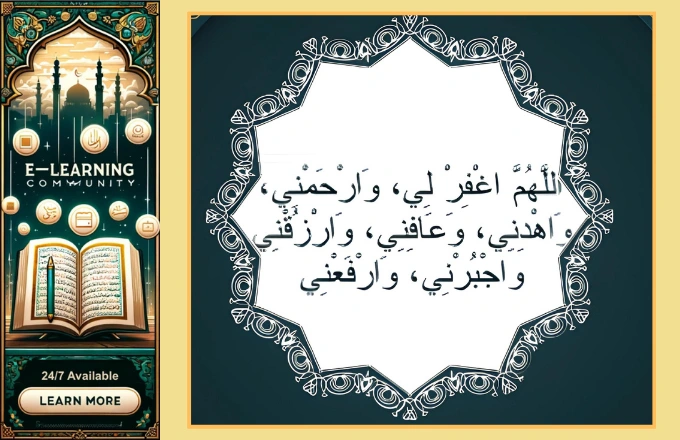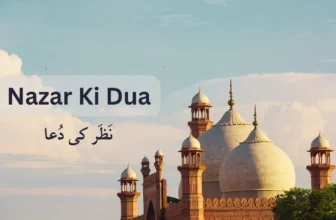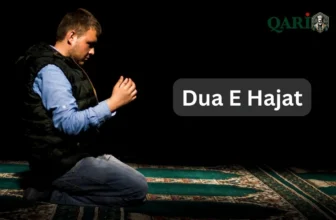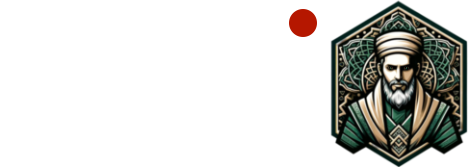
Within Islam, prayer plays a pivotal role as it constitutes one of the Five Pillars that actively guide a Muslim’s daily life. While there are several integral components to these prayers, some are obligatory, while others are recommended or Sunnah.
Among the mandatory aspects is the supplication or dua made between two prostrations, known as Sujood. In this piece, we will delve into the significance and articulation of the dua between Sujood and Sujood. Dive in with us as we explore this profound act of devotion in the English language.
Sujood Meaning
“Sujood” (sometimes spelt “Sajda”) is an Arabic term that refers to the act of prostration in Islamic prayer (Salah). It symbolizes the believer’s deep reverence and submission to God, recognizing His greatness and their own humility before Him.
Sujood Position
When Muslims perform their prayers, there’s a specific moment when they touch their forehead, nose, palms, knees, and toes to the ground. This act is called sujood.
In simple terms, sujood is when a Muslim bows down and places their forehead on the ground during prayer.

Dua between Sujood.
When you perform Sujood (prostration) during Salah, it’s an intimate moment of submission and closeness to Allah. Here’s what you can recite and the recommended supplications:
Upon Entering Sujood:
Start by promoting and praising Allah with the following dua, which should be recited three times:
- adaptation: Subhaana Rabbiyal-A ‘laa.
- Translation: “How perfect my Lord is, The Highest.”
Personal Supplications
After the above invocation, you’re encouraged to make any personal supplications, asking Allah for anything you desire in accordance with your needs and aspirations.
Recommended Dua
If you’re looking for a structured dua to recite during this time, here’s one:
- Adaptation: Subhaanaka Allaahumma Rabbanaa wa bihamdika Allaahum-maghfir lee.
- Translation: “How perfect You are, O Allah, our Lord, and I praise You. O Allah, forgive me.”
اللّهُـمَّ لَكَ سَـجَدْتُ وَبِـكَ آمَنْـت ، وَلَكَ أَسْلَـمْت ، سَجَـدَ وَجْهـي للَّـذي
خَلَقَـهُ وَصَـوَّرَهُ وَشَقَّ سَمْـعَـهُ وَبَصَـرَه ، تَبـارَكَ اللهُ أَحْسـنُ الخـالِقيـن
Allaahumma laka sajadtu wa bika ‘aamantu, wa laka ‘aslamtu, sajada wajhiya lillathee khalaqahu, wa sawwarahu, wa shaqqa sam’ahu wa basarahu, tabaarakallaahu ‘ahsanul-khaaliqeen.
O Allah, unto You I have prostrated and in You, I have believed, and unto You, I have submitted. My face had prostrated before He Who created it and fashioned it and brought forth its faculties of hearing and seeing. Blessed is Allah, the Best of creators.
Subhaana thil-jabarooti, walmalakooti, walkibriyaa’i, wal’adhamati.
How perfect He is, The Possessor of total power, sovereignty, magnificence, and grandeur.
Allaahum-maghfir lee thanbee kullahu, diqqahu wa jillahu, wa ‘awwalahu wa ‘aakhirahu wa ‘alaaniyata hu wa sirrahu.
“O Allah, grant me forgiveness for all my sins, whether they be major or minor, the initial and the most recent, the ones that are visible and those concealed.
، وَأَعـوذُ بِكَ مِنْـك
،لا أُحْصـي ثَنـاءً عَلَـيْك ، أَنْـتَ كَمـا أَثْنَـيْتَ عَلـى نَفْسـِك
- Allaahumma ‘innee ‘a’Oothu Biridhaaka Min Sakhatika, Wa Bimu’Aafaatika Min ‘Uqoobatika Wa ‘a’Oothu Bika Minka, Laa ‘Uhsee Thanaa’an ‘Alayka ‘Anta Kamaa ‘Athnayta ‘alaa nafsika.
- O Allah, I take refuge within Your pleasure from Your displeasure and within Your pardon from Your punishment, and I take refuge in You from You. I cannot enumerate Your praise; you are as You have praised Yourself.

Dua between two Sujood in English.
During the act of Salah, the prostration or Sujood. Sujood is an integral part and is performed twice in succession. While in this position, they recite the following invocation three times:
- Translation: Subhaana Rabbiyal-A ‘laa.
- Meaning: “Glorified is my Lord, The Most High.”
Upon rising from the first Sujood, while sitting momentarily before proceeding to the second Sujood, one can make the following supplications:
- Translation: Rabbighfir lee, Rabbighfir lee.
- Meaning: “O Lord, forgive me. O Lord, forgive me.”
- Adaptation:Allaahum-maghfir lee, Warhamnee, Wahdinee, Wajburnee, Wa ‘Aafinee, Warzuqnee, Warfa’nee.
- Meaning: “O Allah, forgive me, shower Your mercy upon me, guide me, enrich me, grant me health, provide for me, and elevate my status.”
These supplications offer a deep reflection of a Muslim’s plea for guidance, mercy, sustenance, and forgiveness from the Almighty during their Salah.
Dua between two Sujoods in Arabic.
When performing Salah, between the two prostrations (sujoods), you have the option to recite one of two beautiful supplications. Each of these duas serves as a reminder of our reliance on the Almighty and our continuous need for His guidance, mercy, and sustenance. Here they are:
Dua One:
- Adaptation: Rabbighfir lee, Rabbighfir lee.
- Translation: “My Lord, forgive me. My Lord, forgive me.”
- Transliteration: Allaahum-maghfir lee, warhamnee, wahdinee, wajburnee, wa’ aafinee, warzuqnee, warfa’nee.
- Adaptation: “O Allah, forgive me, shower Your mercy upon me, guide me, provide for me, grant me good health, bestow upon me sustenance, and elevate my rank.”
Both of these supplications offer profound reflections of a believer’s aspirations, humility, and desires before their Creator. Choose one that resonates with you and integrate it into your Salah to enhance your connection with the Divine.
Related Posts
Dua between two sujood hadith
Ibn Abbas narrated that the Prophet (peace and blessings be upon him) used to say between the two prostrations, “O Allah, forgive me, have mercy on me, restore me, guide me, and provide for me.”
Is it Sunnah to recite the Dua between two Sujoods?
Yes, it’s a sunnah to recite the dua between Sujood and Sujood as the Prophet (peace and blessing be upon him) used to say it.
- Ibn’ Abbaas (may Allah be pleased with him) narrated that the Prophet (peace and blessings be upon him) used to say between the two prostrations: “Allaahumm ighfir li warhamni wajburni wahdini warzuqni (O Allah, forgive me, have mercy on me, console me, guide me, and grant me provision).”
- It was narrated that the Prophet (blessings and peace of Allah be upon him) used to say between the two prostrations: “Rabb ighfir li, Rabb ighfir li (Lord forgive me, Lord forgive me).”
- At-Tirmidhi narrated from Ibn’ Abbaas (may Allah be pleased with him) that the Prophet (peace and blessings be upon him) used to say between the two prostrations: “Allahumma aghfir li wa’rhamni wa’jburni wa’hdini wa’rzuqni (O Allah, forgive me, have mercy on me, console me, guide me and grant me provision).”
- It was narrated that the Prophet (blessings and peace of Allah be upon him) used to say between the two prostrations: “Rabb ighfir li, Rabb ighfir li (Lord forgive me, Lord forgive me).”
- Muslim narrated from Ibn’ Abbaas (may Allah be pleased with him) that the Prophet (peace and blessings be upon him) said: “And as for prostrating, strive in du’aa’, for it is deserving of a response (from your Lord).”
- Shaykh Ibn Baaz (may Allah have mercy on him) said: “Then he should rise from prostration and say, “Rabb ighfir li, Rabb ighfir li, Rabb ighfir li (Lord forgive me, Lord forgive me, Lord forgive me),”
As the Messenger (peace and blessings be upon him) used to do.
And it is mustahabb to say along with that: “Allahumma aghfir li wa’rhamni wa’hdini wa’jburni wa’rzuqni wa’ aafini (O Allah, forgive me, have mercy on me, guide me, console me, grant me provision and grant me well being),”
Mustahabb
- Shaykh Muhammad ibn Muhammad al-Mukhtaar ash-Shanqeeti said: “The Prophet (peace and blessings be upon him) used to ask for well-being between the two prostrations because this is the place of dua.
The scholars had two opinions concerning that. Some of them said that it is a place for dua, so it is prescribed for a person to offer whatever du’aa’ he likes concerning his affairs in this world and in the Hereafter.
Others Said: That he should limit it to what has been narrated (from the Prophet (blessings and peace of Allah be upon him)), and this view is stronger. But suppose he has yet to memorize it, such as if he is one of the ordinary people. In that case, there is nothing wrong with him saying whatever du’aa’ he can.
Conclusion
This is the view of the majority, as more than one scholar attributed it to them.
So if he is not able to memorize the wording that was narrated, or he does not know it. He says whatever du’aa’ he is able to, such as offering dua for himself and his parents, there is nothing wrong with that.
But it is preferable and better to say the du’aa’ that was narrated from the Prophet (blessings and peace of Allah be upon him).”
More Prayers (Dua)
- Duas for Pain Relief
- Dua For Waking Up: Wake up with incredible grace
- Dua Ganjul Arsh
- Your Fortress Against Harm: Ayatul Kursi and 3 Quls
FAQ’s (frequently asked questions)
How does Dua Between Sujood enhance a Muslim’s connection with Allah?
Dua Between Sujood deepens a Muslim’s connection with Allah by allowing personal supplication during the most humble moment of prayer.
What is Sujood in Islamic prayer?
Sujood in Islamic prayer is the act of prostration, where a Muslim bows down and places their forehead on the ground as a sign of submission to Allah.
Is there a specific recommended Dua to recite between Sujood?
While there’s no specific recommended Dua between Sujood, Muslims can make personal supplications during this moment.
What does the term “Dua Between Sujood” mean?
Dua for Sujood” refers to the prayers or supplications made by a Muslim while in the position of prostration during Salah.
How many times is the Dua Between Sujood recited during prayer?
The Dua Between Sujood is recited multiple times during prayer, typically at least once during each unit of prayer (Rak’ah).







